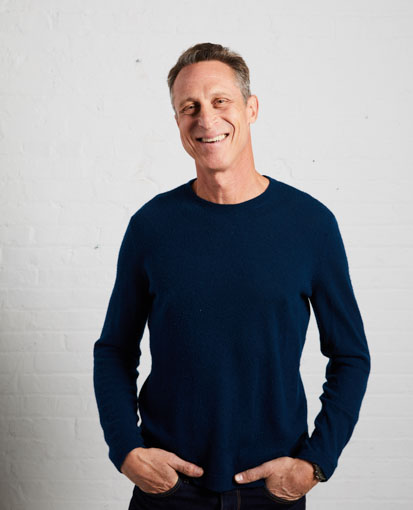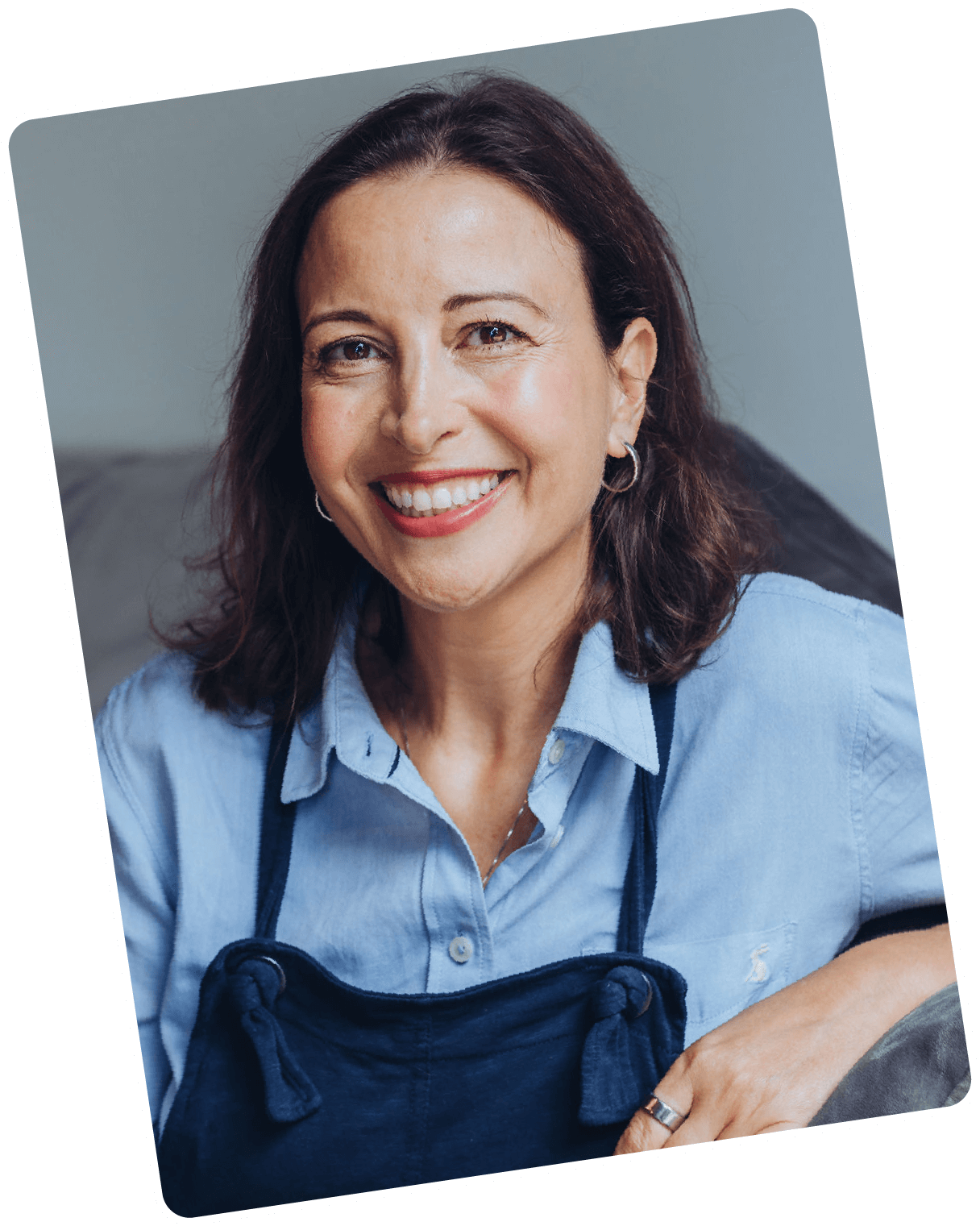It was a real privilege to chat to the visionary doctor, Mark Hyman – the person who first inspired me to take up the role I have now. Dr Hyman has devoted much of his life to spreading functional medicine around the globe. He is a true pioneer.
Functional medicine takes a very different approach from conventional medicine. Rather than focusing on symptoms, functional medicine tackles the root cause of a condition and is remarkably effective at curing “incurable/life-long” conditions that conventional medicine draws a blank on. As Dr Hyman explains, using a functional medicine approach to reverse complex, chronic conditions may sound like a miracle. But, as he spells out, it’s not a miracle. It’s science.

For just one of countless life-transforming examples, here’s how functional medicine reversed a young woman’s multiple sclerosis (as featured recently on NBC’s Today Programme).
Here are three key takeaways from our conversation:
- The current medical paradigm is disease-based and is a reaction to symptoms. Functional medicine focuses on the root cause of conditions and views the body as a system that needs to be in balance to thrive. When we address the factors that are causing people to be out of balance, we see remarkable recoveries.
- Eating real, whole foods is fundamental to our bodies working in the way they are designed to. But the food industry has made a concerted attempt over the years to hijack our kitchens and taste-buds. Sadly, we have gone along with this and been seduced by highly processed convenience “food”– at the cost of our health.
- Getting healthy is a team sport. If you want to make a change, you need to be made accountable to someone and you need to have plenty of support. That’s why health coaching is so important and why, if Dr Hyman were president, he would appoint a million health coaches and get them deployed across every community.
Dr. Hyman is a practising family physician and an internationally recognized leader, speaker, educator and advocate in the field of functional medicine. He is the founder and director of The UltraWellness Center, Senior Advisor for the Cleveland Clinic Center for Functional Medicine, a 14-time New York Times best-selling author and Board President for Clinical Affairs for The Institute for Functional Medicine. He is the host of one of the leading health podcasts, The Doctor’s Farmacy. Dr. Hyman is a regular medical contributor to several television shows and networks, including CBS This Morning, Today, Good Morning America, The View, and CNN. He is also an advisor and guest co-host on The Dr. Oz Show.
You can find out more about Dr. Hyman’s work here.
You’ll find the transcript of some of our conversation below and can listen to the full episode here.
NB. The audio version of this episode features an introduction from me in which I share the very poignant story of my younger son. As a four-year-old, he was misdiagnosed as having a chronic bowel condition and put on medication for several years which did not help because it did not address the root cause of the problem (which was a gut imbalance).
–
–
–
[Please note: this is a computer generated transcription of this conversation]
SG: Tell us a little bit about what is different about the medicine that takes place in this centre?
MH: Well, this is a functional medicine practice. We have three doctors, two physician’s assistants, we have five nutritionists who are nurses. And essentially, we do functional medicine in a pretty advanced way here because we’ve been all doing this for over 20 years. And we see people from all over the world who come in with complex problems that often no one else can treat or fix: everything from cardiometabolic disease, autoimmune diseases, to neurologic problems, to behavioural emotional issues, skin disorders, hormonal disorders, digestive disorders, pretty much everything that we don’t deal well with conventional treatment, we do great job here.
SG: Okay. So give us an idea of what that might look like, you know, an idea of a patient you’ve seen maybe over the past month, who came in with a very complex..?
MG: Okay, well, there was a young girl who had severe autoimmune disease. She had something called mixed connective tissue disorder. She was treated with many medications, which included steroids and chemotherapy drugs. She was getting intravenous saline medrol, which is a very powerful intravenous steroid, every three weeks just to function. She had arthritis, she had muscle damage, she had skin rashes. She had liver inflammation, her blood was affected. She really was quite sick. And she came in and basically rather than saying “what immunosuppressive drug can we give her, how do we shut off her inflammation?” We have a different set of questions, which is why, why is she inflamed? What’s the root cause? And traditional medicine is not great at navigating to the root causes. We’re good at sort of putting out fires but it’s like “whack a mole”. you know, and often the symptoms may be mitigated or improved, but it’s not cured.
And typically, doctors believe that certain diseases can’t be cured like diabetes or autoimmune diseases or dementia. But the truth is, many of them can, and in this young girl, we found she had a terrible history of antibiotics. Her gut was kind of a mess. And a lot of the immune system is in the gut. She was eating a terrible diet. She loves sushi, although it was one redeeming feature she had fish but it was tuna fish, which caused mercury excess in her body which can cause autoimmune disease. And so we eliminated foods that were inflammatory. We gave her an anti-inflammatory diet. We treated her gut because she had a lot of inflammation in her gut that we measured. We looked at her heavy metal levels, she had high mercury so we treated that and we optimised her nutrition, which was not great and nutritional support like vitamin D and fish oil. And within two months, her symptoms were gone. Within a year, she was off all medication, and her numbers are normalised. So when you go see a rheumatologist for example, they’ll check your rheumatoid factor. And if it’s elevated, they never check it again. Because it doesn’t change. But all of her antibody levels went back to normal, except for one which stayed a little bit elevated. But I mean, it was just remarkable to see. And, again, this is something we just don’t see.
SG: Yeah, so that sounds like a miracle.
MH: It sounds like a miracle but it’s just science. The problem is when we have this current paradigm that we’ve all learned which is disease based, and it’s based on a reaction to symptoms. And we never learned how to think about the body, from the point of view of how was it really organised? What are the laws of biology? What is the science of health, and how do you create a healthy person? How do you fix the things that are causing people to be out of balance and how do you put in the things that help people get into balance? And when you do that people get better and it’s just remarkable. It’s not it’s not that hard. Yeah, so it seems like a miracle but it’s just not.
SG: So how much of a factor is lifestyle change in what you do?
MH: So some things are all lifestyle. Some things are more complicated, right? So if someone has Lyme disease or mould exposure or heavy metals, or intestinal infection, there may be more advanced things. But if you start with the foundation, it is really remarkable. I had a patient recently who was a Type 2 diabetic on insulin for 10 years. She had heart failure. Her ejection fraction was 35%, which means your heart’s not pumping very well. She had kidney failure, not on dialysis, but getting there. Liver problems, fatty liver and high liver function tests. She was hypertensive. Her BMI or body mass index was 43, which is, you know, normal is 25 or less and over 30 is obese and she was severely obese. She was on so many medications. She was 65 and maybe had a year or two left. The mortality on heart failure is two years, like worse than a lot of cancers. So she came in we did just, super simple, just changed her diet. Got her on a few basic supplements just like a multi-vitamin, fish oil, nothing super fancy. We used a very strategic diet which is anti inflammatory. It’s low glycaemic. It helps heal the gut and it’s very detoxifying, and essentially, it’s what I’ve created called the 10 Day Detox Diet, but it really is just a derivative of the functional medicine diet that’s helpful for fixing the gut and immune system and blood sugar. Three days, she was off insulin after 10 years on insulin shots. Three months, she lost 43 pounds. Her blood sugar was normal. Her heart failure reversed completely. Her kidney failure reversed completely. Her liver functions normalised. Her blood pressure was normal, and she was off all her medications, and after a year she lost 116 pounds and got her life back. And you by the way, she saved herself on her medication co pay (the American way of copay means you have to pay a certain amount like 20% or 10% of your costs.) Her copay was $20,000 and she saved all that money and what the insurance company is paying who knows was $100,000 or more. Plus, you know her use of medical services and hospitalizations. So you know she saved probably hundreds of thousands of dollars in the health care system every year. But you know, we implemented it with her support of the coach, which is really important for how many people create this team behaviour change. We had her in a group setting. And you know when you see this kind of stuff, you go, and then you hear doctor saying, Well, you can’t reverse diabetes. If you don’t know what to do, you can’t. If you don’t know how to do something, of course you can’t do it. And that’s what we see in medicine. We’re not trained to do this. So we assume it’s can’t be done, where in fact we easily can do it.
SG: Yeah. And I love the fact that you put her in a group scenario so she had that sort of support and didn’t feel alone because that that’s from where I’m coming from as a functional medicine health coach, I know how crucial that support is. I think sometimes people can underestimate how complicated it can be for people and how messy to change their lifestyle when they’ve got so mired in their habits and maybe all their peers eat and drink and live a certain way. It can a really massive challenge. I remember chatting to someone recently who’s a chef, and he really works out so he’s very fit. And he said to me, Suzy, I don’t understand why anyone would be obese. Like all they need to do is…everyone’s got access to the Internet, all they need to do is Google how to eat healthily. And what’s the problem? Many problems with that. I mean, you know, oh, if it were only that simple, but of course it’s not. It’s far more complex.
MH: You shared a story of a guy who wants to lose weight. He was very obese. And he tried for a little bit time and gave up because he said he had no willpower. Now willpower is really a fiction. Because when you eat certain foods, it hijacks your brain chemistry and your hormones in such a way that will power is meaningless, right? If I if I said, you know, I’m going to pay you a million dollars, I want you to hold your breath underwater for 10 minutes. And you had the willpower to do it. There’s no way you could do it because the biology takes over and you have to breathe. And in the same way the foods we’re eating are highly addictive. I don’t know if you saw this study came out last week, where they it was a metabolic ward study where they took two groups of people… I think they did the same people, I don’t remember. Well, the point is they took basically 10 people and they fed them processed food. And then they gave people real food, whole food, eat whenever you want and they put them in a metabolic ward. They were admitted to the hospital for a month, so they tracked everything. And they found that the group that ate the processed food, ate 500 calories more a day because they couldn’t control their hunger because the foods are driving the hunger. Yeah. And then they gained two pounds. The group that had whole food didn’t gain two pounds, they actually lost two pounds. So the four pound difference, if you calculate what that would be over a year, if you eat processed food, you would gain 52 pounds. So simply cutting out anything that is in a package unless it’s real food, then you could easily solve the entire obesity epidemic and save literally trillions of dollars. I mean, I don’t know what the numbers are in the UK. In the US, it’s adding $3.6 trillion in healthcare costs, just from diabetes and obesity.
SG: We’re well on the way, we’re like trotting behind you and unfortunately, you know, we’re the fat man of Europe and it’s not a rosy picture. And what I hear again and again, it’s like, Suzy, it’s so convenient. I think we really have just been sold this myth of convenience. You know, we’re too busy to cook you know, just eat out of a box. Too busy to make your breakfast, here’s a meal replacement bar. And the food industry has been very clever in just jumping on our busy, busy lifestyle. So it’s difficult for people, especially if you haven’t grown up in a family who cooks.
MH: It’s a skill like any other.
SG: Yeah, I agree. I agree. But I think it’s that support so that people can see that it is accessible to them.
MH: I mean, I had a story to tell you is interesting, you know, so the food industry convened in the late 50s, early 60s to try to fight this trend that was happening for people to eat real food. And I don’t know if you ever heard of Betty Crocker?
SG: Let me tell you Mark, my kids really believe that Betty Crocker is a real person.
MH: Betty Crocker was an invention by the food industry to sort of combat the advocacy of another woman named Betty who was a teacher who wanted people to cook and eat real food. And yeah, and so they then they created the Betty Crocker cookbook, which my mother had, which basically put processed food into real food recipes to kind of subvert the American kitchen. So they put in like one can of Campbell’s cream of mushroom soup into this casserole or and, you know, take a Ritz cracker pile and crumble it up and sprinkle it on your broccoli with Velveeta cheese, like a broccoli casserole. And so, then there was the TV dinners and slowly they’ve sort of hijacked the American kitchen and created a deliberate strategy to outsource cooking to corporations. Yeah. And we have willingly gone along with that, you know, McDonald’s tagline was “you deserve a break today”. Right? And what’s happened is we’ve raised now a few generations of people who don’t know how to cook and I can tell you that I can cook three meals in 30 minutes total. Total, and have delicious whole food. Now, I’m not making fancy recipes, but I’m making a quick shake in the morning, maybe a salad and throwing a bunch of maybe pre-washed arugula and cherry tomatoes. I mean, I’ve learned the hacks to make it simple and dinner’s just usually a lot of stir-fried veggies and maybe I throw a sweet potato in the oven or a piece of grass-fed steak or chicken or some fish. And that’s it.
It’s super simple, but there’s something in America called food deserts. Often they should be called food swamps because they’re more like swamps. In one of the worst food deserts in America, this family of five was in a trailer. They were all very obese. Very sick. The father was 42 already on dialysis from kidney failure. The mother was well over 200 pounds and maybe 400, or maybe it was close to 300. The son was 16 and very overweight, 50% body fat. Normal is 10 to 20%. And, and was this close to being diabetic. And they didn’t know how to cook and they were desperate to lose weight because the father could not get a new kidney unless he lost 40 pounds and everything in their trailer within the kitchen was boxed, packaged, canned, low fat this, healthy that you know, peanut butter but it was peanut butter with high fructose corn syrup and trans fats and they really wanted to do the right thing but they didn’t know how to cook. So I said well let’s just like cook a meal together. So we got a guide on how to eat well for less and we got ingredients like real lettuce, and olive oil and vinegar, actual dressing. We made you know turkey chilli, we made we made some roasted sweet potatoes chopped up with herbs and spice in the oven. And I don’t know what else we made some stir fry asparagus. They didn’t know how to stir fry a vegetable. They didn’t know how to make a salad. I mean, they didn’t know anything. And they’re like, this is fun and we did it together. And it didn’t take that long and then they were like this is great. I said you can do this and I left and I’m like, here’s my cookbook. Here’s a guide on how to eat well for less. They didn’t even have cutting boards or knives. So I literally went home and went on Amazon and I ordered cutting boards and knives and I had them shipped to their house. And the mother texted me in the first week they lost 18 pounds together, the family started cooking, they lost 200 pounds together. His son lost 50 and gained it all back because he went to work at the only place to get jobs out there which are fast food restaurants. It’s just like putting an alcoholic in a bar to work. He finally got out of that and he lost 138 pounds. And he went to medical school and all that took was showing them what was in their cupboards. Like I literally showed them like Cool Whip says zero trans fat, but all it is trans fat and sugar and the reason it says zero trans fat is because the government, which is in cahoots with industry, has allowed them to say it has zero trans fats at less than half a gramme per serving as it’s mostly air. It’s like basically sugar and trans fat. Yeah, like they showed them all this and they were like yeah, and they had no idea and we got rid of all it.
Yeah, I think the myth that cooking is expensive. That it takes more time, that it’s difficult. It’s like any other skill. Like, would you drive a car without learning some basic skills? No. You need to know how to chop and then know how to cut an onion. They didn’t know how to peel garlic. They didn’t know how to mix the salad dressing. I mean these are just building blocks of cooking that are so simple. You need to know how to roast and bake and stir fry.
SG: And it’s funny what you said about the food industry hijacking the recipes because it actually reminded me that it wasn’t so long ago, I was actually promoting Sweet ‘n Low in the UK. And one of the things they gave us was these recipes. It was like a can of Campbell’s soup and it was all food industry stuff but they’re kind of dressed up as home cooking. But I’ve switched job since then, as you know. I love my job because I help people navigate their way through all this conflicting information. But the point is, from my experience, it takes personal support, in addition to the information to help people actually implement it.
MH: For sure, I think getting a health coach, getting someone to do it with, being in a group. Yeah, faith-based wellness programmes. Whatever, whatever you can do to get A buddy. You know, I did a health programme in a church with a pastor in America and he’s said every body needs a buddy. Yeah, getting healthy is a team sport. And so we all need that, you know? And the truth is we know from the data, you’re more likely to be overweight if your friend’s overweight and your environment plays a huge role, that your zip code is more important than your genetic code. So I think we really need to remind ourselves that you know, if you want to make a change, you need to be accountable, you need to have support, and that really is what works.
SG :Okay, so how do you feel health coaching will evolve over the next few years?
MH: Well, if I were king, or prime minister or president, I would literally hire a million health coaches to help solve our chronic disease epidemic and get them deployed across every healthcare system in every community.




0 Comments